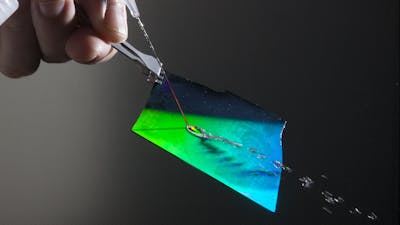
The need for an inexpensive, super-repellent surface cuts across a vast swath of societal sectors—from refrigeration and architecture, to medical devices and consumer products. Most state-of-the-art liquid repellent surfaces designed in the last decade are modeled after lotus leaves, which are extremely hydrophobic due to their rough, waxy surface and the physics of their natural design. However, none of the lotus-inspired materials designed so far has met the mark: they may repel water but they fail to repel oils, fail under physical stress, cannot self-heal – and are expensive to boot.
‘SLIPS’ technology, inspired by the slippery pitcher plant that repels almost every type of liquid and solid, is a unique approach to coating industrial and medical surfaces that is based on nano/microstructured porous material infused with a lubricating fluid. By locking in water and other fluids, SLIPS technology creates slick, exceptionally repellent and robust self-cleaning surfaces on metals, plastics, optics, textiles and ceramics. These slippery surfaces repel almost any fouling challenge a surface may face—whether from bacteria, ice, water, oil, dust, barnacles, or other contaminants.
The versatility of SLIPS, their robustness and unique ability to self-heal makes it possible to design these surfaces for use almost anywhere, even under extreme temperature and pressure conditions.

SLIPS is being commercialized by Adaptive Surface Technologies (formerly SLIPS Technologies, Inc.), a company spun out of the Wyss Institute, which will provide material coating solutions to multiple industrial, consumer and biomedical markets by creating customized, highly repellent slippery surfaces for a broad range of applications.
